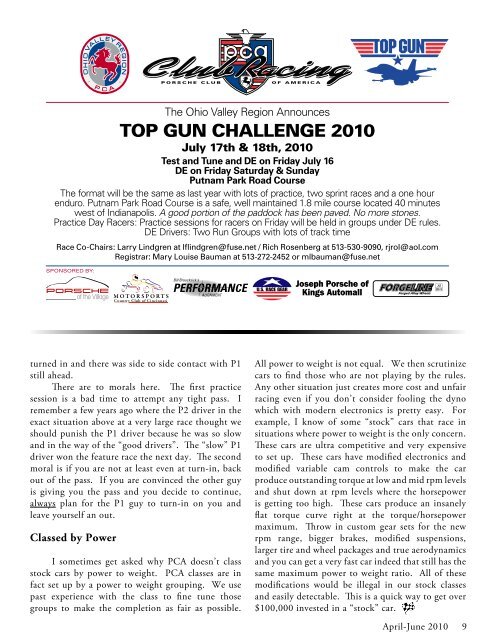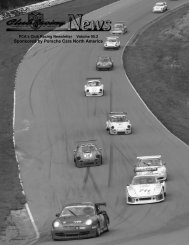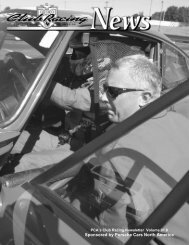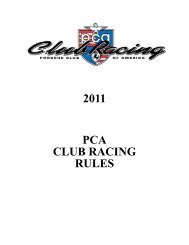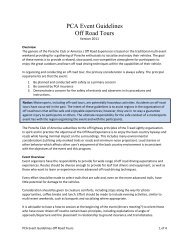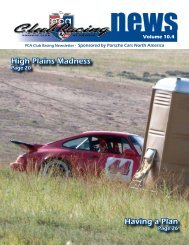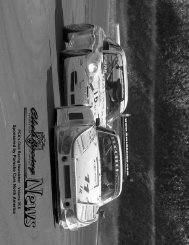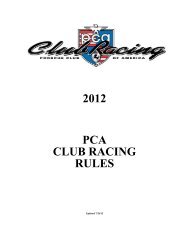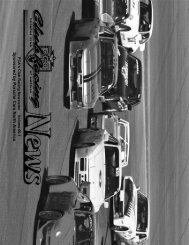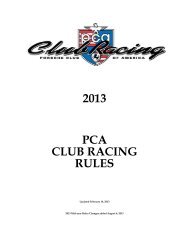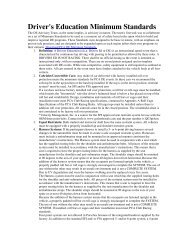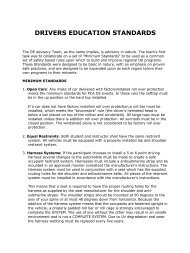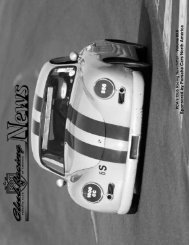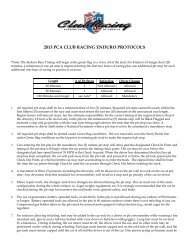Handling Curves Pastures of Heaven - Porsche Club of America
Handling Curves Pastures of Heaven - Porsche Club of America
Handling Curves Pastures of Heaven - Porsche Club of America
You also want an ePaper? Increase the reach of your titles
YUMPU automatically turns print PDFs into web optimized ePapers that Google loves.
The Ohio Valley Region Announces<br />
TOP GUN CHALLENGE 2010<br />
July 17th & 18th, 2010<br />
Test and Tune and DE on Friday July 16<br />
DE on Friday Saturday & Sunday<br />
Putnam Park Road Course<br />
The format will be the same as last year with lots <strong>of</strong> practice, two sprint races and a one hour<br />
enduro. Putnam Park Road Course is a safe, well maintained 1.8 mile course located 40 minutes<br />
west <strong>of</strong> Indianapolis. A good portion <strong>of</strong> the paddock has been paved. No more stones.<br />
Practice Day Racers: Practice sessions for racers on Friday will be held in groups under DE rules.<br />
DE Drivers: Two Run Groups with lots <strong>of</strong> track time<br />
Race Co-Chairs: Larry Lindgren at lflindgren@fuse.net / Rich Rosenberg at 513-530-9090, rjrol@aol.com<br />
Registrar: Mary Louise Bauman at 513-272-2452 or mlbauman@fuse.net<br />
SPONSORED BY:<br />
turned in and there was side to side contact with P1<br />
still ahead.<br />
There are to morals here. The first practice<br />
session is a bad time to attempt any tight pass. I<br />
remember a few years ago where the P2 driver in the<br />
exact situation above at a very large race thought we<br />
should punish the P1 driver because he was so slow<br />
and in the way <strong>of</strong> the “good drivers”. The “slow” P1<br />
driver won the feature race the next day. The second<br />
moral is if you are not at least even at turn-in, back<br />
out <strong>of</strong> the pass. If you are convinced the other guy<br />
is giving you the pass and you decide to continue,<br />
always plan for the P1 guy to turn-in on you and<br />
leave yourself an out.<br />
Classed by Power<br />
I sometimes get asked why PCA doesn’t class<br />
stock cars by power to weight. PCA classes are in<br />
fact set up by a power to weight grouping. We use<br />
past experience with the class to fine tune those<br />
groups to make the completion as fair as possible.<br />
All power to weight is not equal. We then scrutinize<br />
cars to find those who are not playing by the rules.<br />
Any other situation just creates more cost and unfair<br />
racing even if you don’t consider fooling the dyno<br />
which with modern electronics is pretty easy. For<br />
example, I know <strong>of</strong> some “stock” cars that race in<br />
situations where power to weight is the only concern.<br />
These cars are ultra competitive and very expensive<br />
to set up. These cars have modified electronics and<br />
modified variable cam controls to make the car<br />
produce outstanding torque at low and mid rpm levels<br />
and shut down at rpm levels where the horsepower<br />
is getting too high. These cars produce an insanely<br />
flat torque curve right at the torque/horsepower<br />
maximum. Throw in custom gear sets for the new<br />
rpm range, bigger brakes, modified suspensions,<br />
larger tire and wheel packages and true aerodynamics<br />
and you can get a very fast car indeed that still has the<br />
same maximum power to weight ratio. All <strong>of</strong> these<br />
modifications would be illegal in our stock classes<br />
and easily detectable. This is a quick way to get over<br />
$100,000 invested in a “stock” car.<br />
April-June 2010 9


